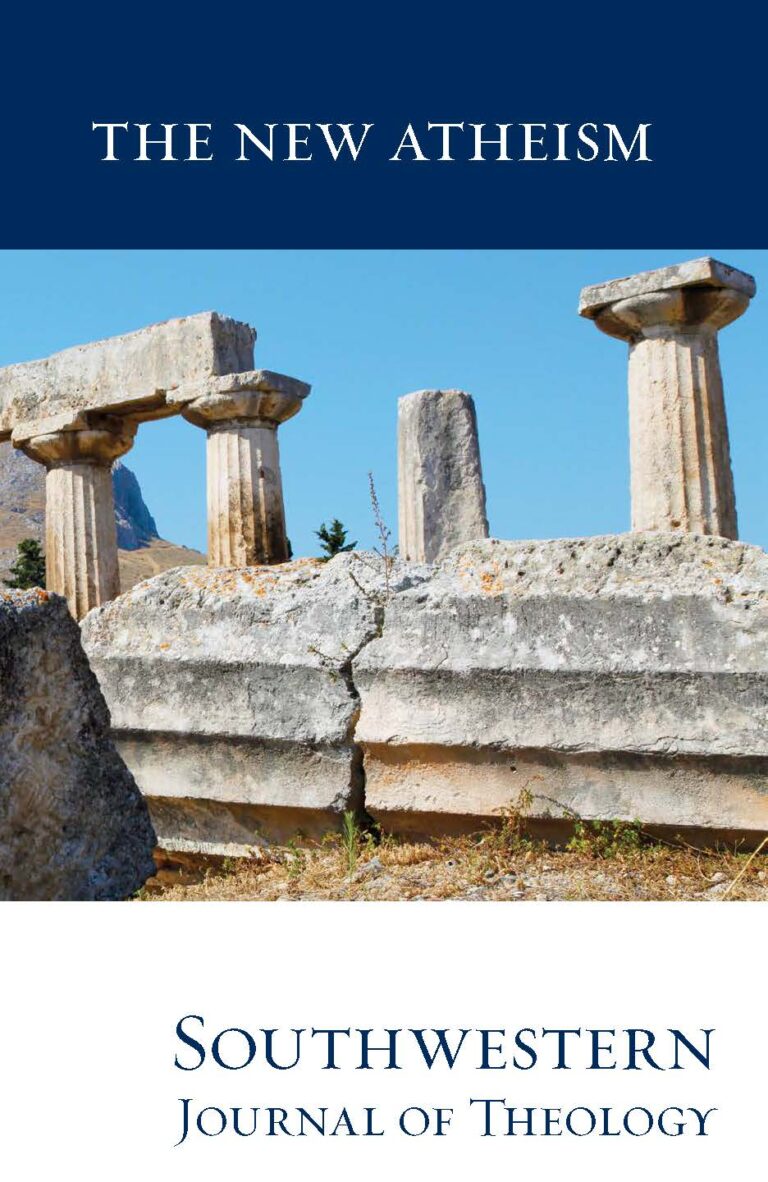
The New Atheism
Southwestern Journal of Theology
Volume 54, No. 1 – Fall 2011
Managing Editor: Malcolm B. Yarnell III
By Lucy Huskinson. Peabody, MA: Hendrickson, 2009. 106 pages. Softcover, $14.99.
Friedrich Nietzsche is much maligned in Christian circles and most often criticism of him is justified. It is thus somewhat surprising and most certainly unique that anyone would attempt to approach Nietzsche’s thoughts as being relevant to Christians. Huskinson has commendably succeeded in displaying Nietzsche’s relevance to a complacent Christian church.
How is it possible that a philosopher who proclaimed a “death of God” movement be significant to the Christian church? Is it imaginable that this man whose writings are deeply controversial can have anything to say to the future of Christian discipleship? Perhaps more so than the so-called “new atheists,” Nietzsche may have unveiled something noteworthy, albeit not overwhelmingly profound, as to how Christians ought to be and act. Yet as Huskinson herself admits one cannot take this too far. After all, Nietzsche’s ideas cannot be seen to support Christianity since “Nietzsche rejects Christ” (80).
Many have tried to rationalize the thoughts of Nietzsche. However, because his ideas lack systematic cohesion, such attempts usually have mixed results. In addition, such attempts to bring order to a philosopher who would have shunned such a label, has led to wildly differing assessments as to Nietzsche’s motivations, priorities as well as his train of thought.
As such, while Huskinson has a definite purpose in writing this work, she does not pretend that she has successfully solved the enigma surrounding the philosopher’s many and controversial ideas. Her sole purpose seems to be to highlight “Nietzsche’s search for, and explanation of authentic divinity” via the reevaluation of Christian values and the emphasis of what he regards to be an “affirmation of life” (xiii–xiv).
There are various key aspects of Nietzsche’s thoughts that Huskinson helpfully highlights. One of these aspects is the concept of the “will to power” and its contrast with the “will to truth.” The will to power has the purpose of accepting a “tension and creative dialogue between opposites [and in doing so emphasizes] human growth . . . in terms of infinite possibility and perspective, whereby we continually shape and reshape who we are” (4–5). In sharp contradistinction to the will to power, the will to truth is (for Nietzsche), where life is “lived according to a perceived fixed ideal” (6). Nietzsche views Christianity as a prime example of such a perceived fixed ideal.
In doing so, Nietzsche also believes that Christianity is the very embodiment of what many have (justifiably) accused Nietzsche of promoting—Nihilism. Huskinson is careful to point out that the philosopher is of the view that Christianity does not affirm life but rather “negates the meaningfulness of human life” (7). Christianity, he insists, treasures the use of reason that leads to objective truth, instead of prizing the emotions and instincts (8, 60).
Another problem with Christianity, according to Nietzsche is that it promotes what is termed a “slave morality” that included aspects that are undesirable, including “sin, guilt, pity, cruelty, good and evil,” (11) as well as bad conscience and resentment (16–25). In contrast to this Huskinson mentions that Nietzsche’s “master morality,” is more fluid and hence varies according to different circumstances (13), affirms the self (14), and does not thrive on resentment of others (15).
For Nietzsche, Christianity has no use and no worth (42) and so when Nietzsche talks about his “death of God,” Huskinson astutely indicates he is not so much attempting to pronounce a metaphysical assertion regarding God but merely indicating the changing of the times and the values of society (51); and perhaps he is also indicating the maturing of humanity from a pessimistic nihilism (as illustrated by Christian beliefs) to an active nihilism that is optimistic, free from fetters, and able to able to formulate new values creatively (35–54).
Nietzsche’s ultimate man is the so-called Ubermensch, frequently translated as ‘superman.’ Such a man is not ruled by reason but rules in chaos and his instincts (60). He creates out of his whim what he wishes in a child-like innocence without recourse to conscience and tradition and he constantly seeks to overcome himself in whatever way necessary (61–74). All in all, in all except the final chapter, Huskinson paints a portrait of Nietzsche’s philosophy that seems (a) not only impossible to reconcile with Christianity but also (b) so inconsistent with the Christian faith that it is difficult to see much use for it.
However, the thrust or whole point of Huskinson’s argument is revealed in the final chapter. She contends that what we can learn from Nietzsche is similar to what we can learn from Bonhoeffer (83). Christians must allow and invite test of their faith (82) in order to prove that their faith is not only genuine but worthy to be a way of life that an individual may embrace (84). Since Nietzsche not only did not find Christians in his surrounding who were willing to do that but also did not believe that any Christian who had their faith tested who choose to remain in their faith, he viewed it as an unworthy way of life. Huskinson believes that this can be a “wakeup call for lazy Christians today” (89) and so she encourages followers of Christ to challenge themselves and question their prejudices as well as indulge in continual self-criticism in order to distill their faith into a purer version (92).





